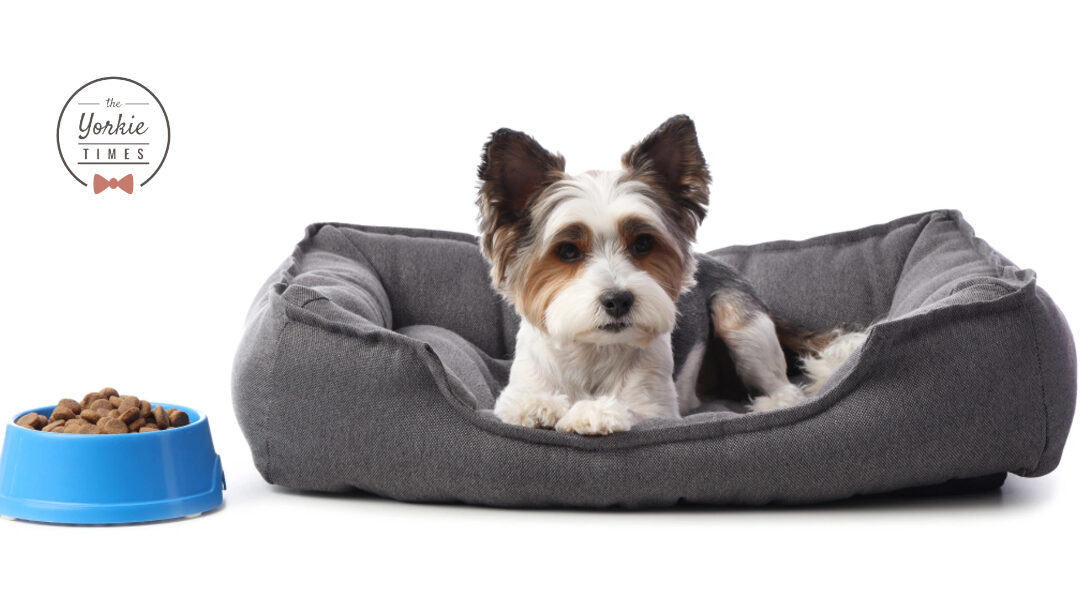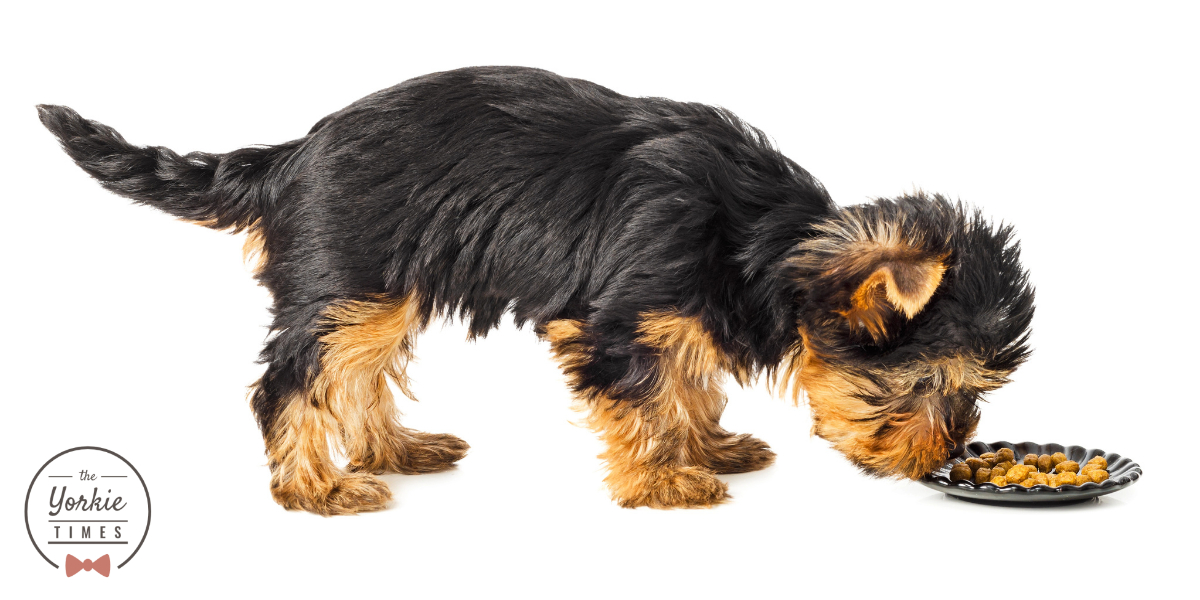Have you asked yourself, what should I feed my dog? It can be so confusing.
Feeding your Yorkshire Terrier or other small dogs goes beyond just putting food in a bowl; it’s about giving them the right nutrition for a happy and healthy life. We know proper nutrition is vital for Yorkies and other small dogs because they are prone to specific health issues like obesity and dental problems. So how do we choose the right food, not to mention figuring out portion control, common food allergies, healthy treats, special dietary considerations, and all the other curveballs our dogs throw at us?
Let’s start with the basics.
Understanding Your Yorkie’s Nutritional Needs
Yorkshire Terriers have specific dietary needs because of their small size and high energy levels. We all watch our dog’s zip around with energy we envy, so our Yorkies require a diet that is rich in protein and fat to stay healthy and keep that energy.
What does protein and fat actually do for our dogs?
Protein: This nutrient is crucial for muscle growth, tissue repair, and a strong immune system. Look for high-quality animal protein sources like chicken, turkey, or fish as the main ingredients in their food. Protein not only helps maintain muscle mass but also provides the energy Yorkies need for their playful activities.
Fats: Healthy fats are also important in every dogs’s diet. They offer a concentrated source of energy and are essential for keeping skin healthy and coats shiny. Omega fatty acids, especially omega-3 and omega-6, are particularly beneficial because they support heart health and reduce inflammation.
In addition to protein and fats, Yorkies need a balanced intake of carbohydrates, vitamins, and minerals to ensure overall well-being. According to the American Kennel Club (AKC), a well-rounded diet tailored to a dog’s specific needs can help prevent common health issues. Learn more about dog nutrition here.
Choosing the Right Dog Food
You walk into the pet food isle and are faced with a plethora of choices. What should you choose?
As a dog owner, we have several choices: commercial dog food (both dry and wet) and homemade diets. Each of them can have its advantages and disadvantages, so it’s important to choose what’s best for your Yorkie.
Commercial Dog Food: Dry kibble is a popular choice because it is convenient, easy to store, and helps keep your dog’s teeth clean by reducing tartar buildup. Many brands offer specialized formulas designed for small breeds like Yorkies.
On the other hand, wet food can be tastier for picky eaters and provides extra moisture in their diet, which is great for hydration (extra important in senior dogs). However, wet food can be more expensive and may not help with dental health as much as dry kibble. Try to select high-quality brands that list meat as the first ingredient and avoid fillers like corn and soy, which doesn’t offer your dog much in the way of nutritional value.
Homemade Diets: Cooking for your Yorkie can ensure they get fresh, healthy ingredients. However, it requires careful planning to meet all their nutritional needs, including proteins, fats, carbohydrates, vitamins, and minerals. Consulting with a veterinarian or pet nutritionist can help you create a balanced homemade diet. There are many recipe books out there, but I haven’t tried them yet.
For a detailed guide on choosing the right dog food, check out this article from PetMD: Choosing the Right Dog Food.
Portion Control and Feeding Schedule
Portion control is vital for preventing obesity in Yorkshire Terriers. Due to their small size, Yorkies can easily gain weight if they eat too many calories. The recommended daily caloric intake for a Yorkie varies depending on factors like age, weight, and activity level, but it generally falls between 200 and 400 calories. For instance, a more active Yorkie may need closer to 400 calories, while a less active one might only require about 200 calories. I stick with the recommended serving based on size, unless the vet states otherwise.
My Rosie is almost 15 and she has lost a noticeable amount of weight, so we routinely bribe her with crumbled cooked ground beef to get her to eat the vet senior food that she is very unenthused about. Our vet approved it in small moderation to get her started, but not as a replacement.
To manage portion sizes effectively, it’s important to measure your Yorkie’s food using a standard measuring cup. This practice helps prevent overfeeding and ensures your dog gets the right amount of nutrients.
If you are having the opposite issue, establishing a regular feeding schedule can also help control their weight and improve digestion. Most experts recommend feeding adult Yorkies two meals a day, spaced about 12 hours apart. Puppies, however, may need three to four smaller meals throughout the day to support their growth and energy needs.
By following these guidelines for portion control and feeding schedules, you can help your Yorkie maintain a healthy weight and overall well-being. For more information on feeding your dog, VCA Hospitals provides valuable insights: Feeding Your Dog.

Common Food Allergies and Sensitivities
Yorkshire Terriers can be prone to food allergies, which may show up as skin irritations, stomach problems, or ear infections. These issues can greatly affect your Yorkie’s comfort and health, so it’s important to recognize common allergens that might cause these reactions.
Common Allergens:
- Chicken: Many dogs, including Yorkies, can develop an allergy to chicken. Symptoms may include itching, hives, or upset stomach.
- Beef: Beef is another common allergen that can lead to similar symptoms as chicken allergies. If your Yorkie seems uncomfortable after eating beef, it might be best to remove it from their diet.
- Grains: Some Yorkies are sensitive to grains like wheat and corn. These ingredients can result in digestive issues, skin irritations, or even ear infections in sensitive dogs.
If you notice any signs of food allergies, such as excessive scratching, vomiting, or diarrhea, it’s important to consult your veterinarian. They can provide guidance on how to adjust your Yorkie’s diet to alleviate these issues. For more information on food allergies in dogs, visit The Spruce Pets: Food Allergies in Dogs.
Treats and Supplements
Treats are an important part of training and bonding with your Yorkshire Terrier. They can motivate your dog during training sessions and help strengthen the relationship between you and your pet. However, it’s essential to choose healthy options to avoid weight gain and other health issues. Look for low-calorie, natural treats that are specifically designed for small breeds. These treats not only taste great but also provide essential nutrients that your Yorkie needs.
In addition to treats, supplements can enhance your Yorkie’s diet, especially if they have specific health concerns. For example, omega fatty acids are beneficial for keeping your dog’s skin healthy and coat shiny. Probiotics can improve digestion and boost the immune system, while multivitamins can help fill any gaps in nutrition, ensuring your dog gets all the necessary vitamins and minerals.
When introducing new treats or supplements, it’s always a good idea to consult your veterinarian. They can recommend the best options based on your Yorkie’s individual needs and health status. For more ideas on healthy treats, check out this article from PetMD: Healthy Treats for Dogs.
Special Dietary Considerations
As Yorkshire Terriers age or if they develop specific health issues, their dietary needs can change significantly. Senior Yorkies often benefit from diets that are lower in calories but higher in fiber. This type of diet helps maintain a healthy weight and supports good digestion, which can become more challenging as dogs get older. A diet rich in fiber can also help prevent constipation and other digestive problems.
For Yorkies with specific health conditions, such as diabetes or kidney disease, specialized diets are usually necessary. Dogs with diabetes may need a diet that is lower in carbohydrates and higher in protein to help manage their blood sugar levels effectively. In contrast, Yorkies with kidney disease might require a diet that is lower in protein and phosphorus to reduce the strain on their kidneys.
It’s essential to consult your veterinarian for personalized dietary recommendations that are tailored to your Yorkie’s age, health status, and lifestyle. Your vet can help you choose the best food and supplements to meet your dog’s unique needs. For more guidance on senior dog nutrition, the AKC provides valuable information: Dietary Needs of Senior Dogs.
Keeping Your Small Dog Healthy And Happy
Feeding your Yorkshire Terrier the right diet is essential for their health and happiness. And remember there is no one size fits all and to talk to your vet about your dog’s particular needs. Regular check-ups with your veterinarian will provide advice that fits your Yorkie’s needs, allowing you to make informed choices about their diet.
Your vet will have a rounded picture of your dog’s their nutritional needs, choosing the right food, managing portion sizes, and being aware of allergies and special dietary requirements; their job is to help ensure that your dog lives a long and healthy life.
As you take this step in providing the best nutrition for your Yorkie, remember that you’re not alone. We’d love to hear from you! Whether it’s about dietary concerns, recommendations for treats, or anything else related to your Yorkie’s nutrition, your questions are welcome.
Please feel free to share your thoughts in the comments below. Together, we can make sure our pets thrive!





Recent Comments